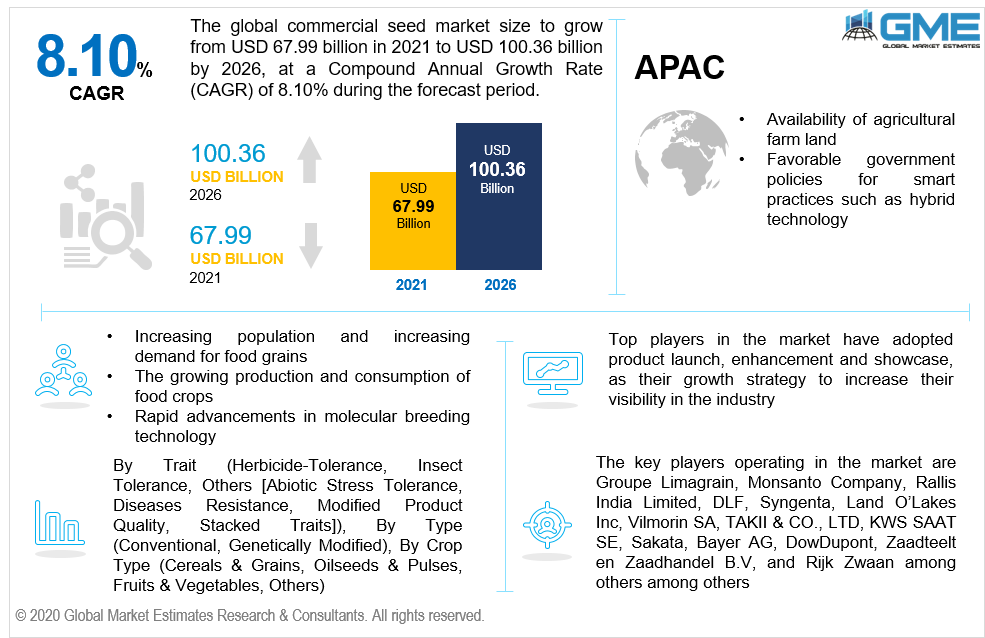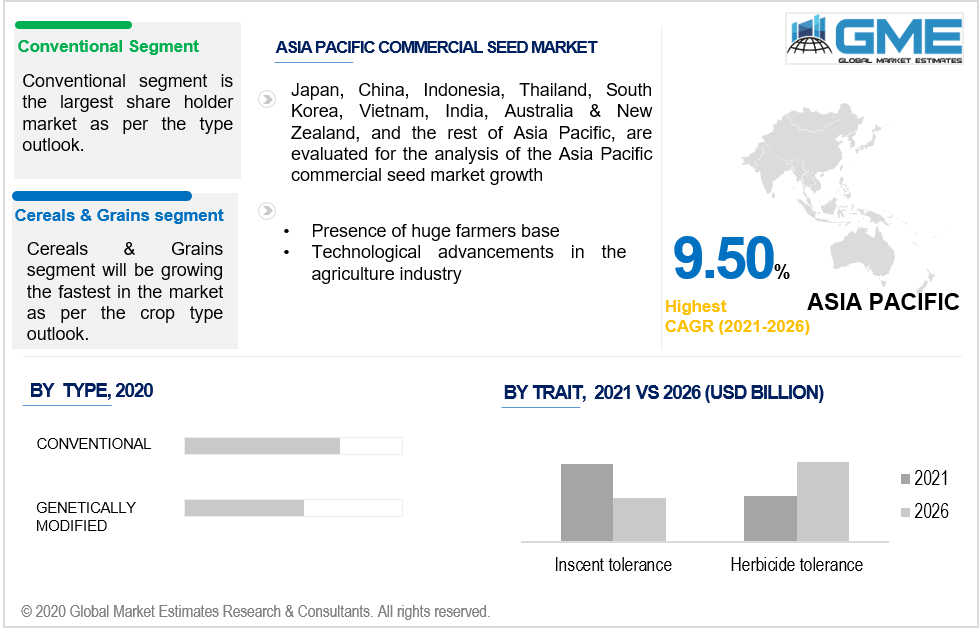
Global Commercial Seed Market Size, Trends, and Analysis- Forecasts To 2026 By Trait (Herbicide-Tolerance, Insect Tolerance, Others [Abiotic Stress Tolerance, Diseases Resistance, Modified Product Quality, Stacked Traits]), By Type (Conventional, Genetically Modified), By Crop Type (Cereals & Grains, Oilseeds & Pulses, Fruits & Vegetables, Others), By Region (North America, Asia Pacific, CSA, Europe, and the Middle East and Africa); End-User Landscape, Company Market Share Analysis & Competitor Analysis
The global commercial seed market will register a high growth rate from 2021-2026. Growing population, increasing demand for biofuels, growing seed replacement rate, and organic farming are the key factors supporting the market growth. The growing production and consumption of food crops such as pulses and cereals are positively impacting the market. Rapid advancements in molecular breeding technology, hybrid technology, and growing demand for protein- and vitamin-rich diets are boosting the market growth for commercial seeds. However, the change in climatic conditions and global warming will restrain market growth.

By trait segment, the market is studied into insect tolerance, abiotic stress tolerance, herbicide tolerance, and disease resistance among others. The other segment is further divided into stacked traits, modified product quality, and disease resistance among others. The other segment will dominate the global market and continue the trend from 2021-2026. Growing demand and preference for multiple stacked traits are positively impacting the market segment.
Based on the crop type, the market is divided into fruits & vegetables, cereals & grains, and oilseeds & pulses among others. Among all the segments, the crops grains & cereals type segment holds the largest share and is also expected to continue the trend from 2021-2026. The growing consumption of cereals and grains such as wheat, maize, corn, rice, and barley are positively impacting the market. The oilseeds & pulses type will propel at a high rate in the global market.
Based on the type, the seed market is segregated into conventional and genetically modified types. The conventional segment will dominate the global market. The major crops such as cotton, cereals, vegetables & fruits and maize, among others come under the conventional type. The rapid change in food habits along with increasing consumption of organic products are the key drivers responsible for market growth. The ease in availability, pocket friendly, and high demand for hybrid seeds are positively impacting the segment growth.

By region analysis, the North American region is dominating the market and will continue the trend in the global market. The presence of leading commercial seed suppliers such as Dow AgroSciences, Arysta LifeScience, Monsanto, and DuPont, among others are helping to propel the regional growth. The Asia Pacific region will occupy a significant share and will hold a high CAGR from 2021-2026. Technological advancements in the agriculture industry and growing demand for mass production of food grains are boosting the market growth.
Key players operating in the market include are Groupe Limagrain, Monsanto Company, Rallis India Limited, DLF, Syngenta, Land O’Lakes Inc, Vilmorin SA, TAKII & CO., LTD, KWS SAAT SE, Sakata, Bayer AG, DowDupont, Zaadteelt en Zaadhandel B.V, and Rijk Zwaan among others among others.
Please note: This is not an exhaustive list of companies profiled in the report.
We value your investment and offer free customization with every report to fulfil your exact research needs.
The Global Commercial Seed Market has been studied from the year 2019 till 2026. However, the CAGR provided in the report is from the year 2021 to 2026. The research methodology involved three stages: Desk research, Primary research, and Analysis & Output from the entire research process.

The desk research involved a robust background study which meant referring to paid and unpaid databases to understand the market dynamics; mapping contracts from press releases; identifying the key players in the market, studying their product portfolio, competition level, annual reports/SEC filings & investor presentations; and learning the demand and supply side analysis for the Commercial Seed Market.

The primary research activity included telephonic conversations with more than 50 tier 1 industry consultants, distributors, and end-use product manufacturers.

Finally, based on the above thorough research process, an in-depth analysis was carried out considering the following aspects: market attractiveness, current & future market trends, market share analysis, SWOT analysis of the companies and customer analytics.

Tailor made solutions just for you
80% of our clients seek made-to-order reports. How do you want us to tailor yours?
OUR CLIENTS